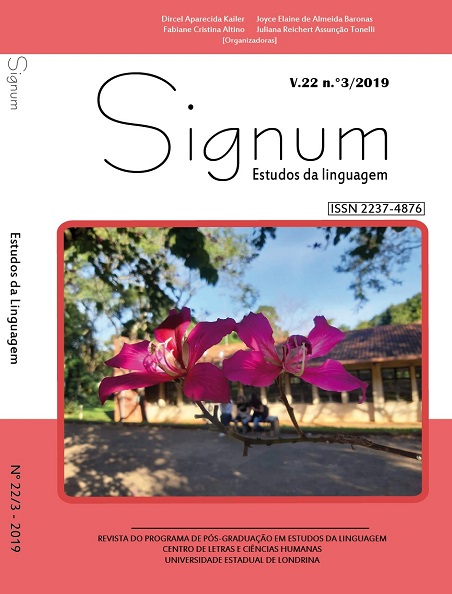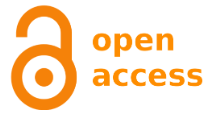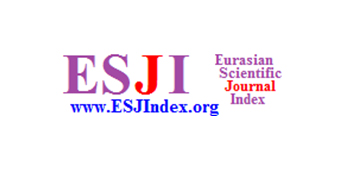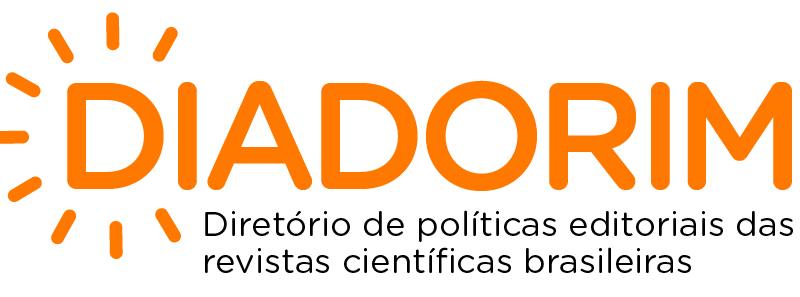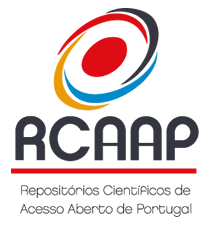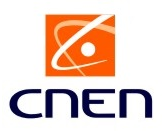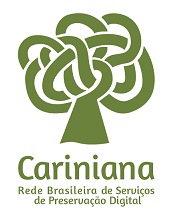The Overcoming of an Intercultural Misunderstanding in Teletandem
DOI:
https://doi.org/10.5433/2237-4876.2019v22n3p50Palavras-chave:
teletandem, telecollaboration, intercultural misunderstanding.Resumo
Resumo:
A telecolaboração envolve o uso de tecnologias online no contexto de ensino e aprendizagem
de línguas (BELZ, 2007; O'DOWD, 2013). Quando diferentes culturas se encontram,
mal-entendidos interculturais (BELZ, 2002, 2007; AGAR, 2006; O'DOWD, 2012; SOUZA,
2016) podem surgir. Este estudo teve o objetivo de discutir como ocorreu a superação de
um mal-entendido intercultural em uma parceria no teletandem (TELLES, 2015a, 2015b),
o contexto telecolaborativo específico nesse estudo, entre uma aprendiz de inglês e uma
aprendiz de português. Para as análises, foram incluídos dados de sessões de teletandem,
uma sessão de mediação, relatórios de experiência, entrevistas, mensagens privadas no
Facebook e diário reflexivos. A análise dos dados mostrou que o diálogo com o "outro"
(KRAMSCH, 1993, 2005; HELM, 2016) - entre uma das participantes e o professormediador - favoreceu a superação do mal-entendido intercultural, o que indica que há a
necessidade de o professor-mediador proporcionar momentos de reflexão em casos de
possíveis mal-entendidos interculturais em contextos telecolaborativos.
Abstract:
Telecollaboration involves the use of online technologies in the context of language teaching
and learning (BELZ, 2007; O'DOWD, 2013). When different cultures come into contact,
intercultural misunderstandings (BELZ, 2002, 2007; AGAR, 2006; O'DOWD, 2012;
SOUZA, 2016) can emerge. This study aimed at discussing how the overcoming of an
intercultural misunderstanding occurred in a Teletandem (TELLES, 2015a, 2015b)
partnership, the specific telecollaborative context in this study, between a learner of English
and a learner of Portuguese. For the analysis, data from telecollaborative sessions, a mediation
session, experience reports, interviews, private messages on Facebook and reflective diaries
were included. Data analysis showed that the dialogue with the "other" (KRAMSCH, 1993,
2005; HELM, 2016), - that is, between one of the participants and the teacher-mediator -
favored the overcoming of the intercultural misunderstanding, which indicates that there is
the need for the teacher-mediator to provide moments of reflection in cases of possible
intercultural misunderstandings in telecollaborative contexts.
Downloads
Referências
mediação da aprendizagem. 2015. Tese (Doutorado em Estudos Linguísticos) -
Universidade Estadual Paulista, São José do Rio Preto, 2015.
AGAR, M. Language shock: Understanding the culture of conversation. New York:
William Morrow, 1994.
AGAR, M. Culture: Can you take it anywhere? International Journal of Qualitative Methods,
v. 5, n. 2, p. 1-12, 2006.
AVVAL, S. F. How to avoid communication breakdown in translation or
interpretation? Translation Journal, v. 16, n. 2, p. 35-41, 2011.
BELZ, J. A. Social dimensions of telecollaborative foreign language study. Language
Learning & Technology, v. 6, n. 1, p. 60-81, 2002.
BELZ, J. A. The development of intercultural communicative competence in
telecollaborative partnerships. In: O'DOWD, R. (ed.). Online Intercultural Exchange:
An introduction for foreign language teachers. Clevedon: Multilingual Matters, 2007.
p. 127-166.
BREDELLA, C. L. For a flexible model of intercultural understanding. In: ALRED, G.;
BYRAM, M.; FLEMING, M. (ed.). Intercultural experience and education. Clevedon:
Multilingual Matters, 2002. p. 31-49.
BYRAM, M. Teaching and assessing intercultural communicative competence. Clevedon:
Multilingual Matters, 1997.
BYRAM, M. The Cultnet Intercultural Citizenship Project. In: O'DOWD, R; LEWIS, T.
(ed.). Online Intercultural Exchange: Policy, Pedagogy, Practice. New York: Outledge,
2016. p. 256-262.
CROZET, C.; LIDDICOAT, A. J. The challenge of intercultural language teaching:
Engaging with culture in the classroom. In: LO BIANCO, J.; LIDDICOAT, A. J.;
CROZET, C. (ed.). Striving for the Third Place: Intercultural competence through
language education. Canberra: Language Australia, 1999. p. 113-126.
DERVIN, F. Exploring 'new' interculturality online. Language and Intercultural
Communication, v. 14, n. 2, p. 191-206, 2014.
DÖRNYEI, Z. Research methods in Applied Linguistics. Oxford: Oxford University Press,
2007.
DUFF, P. Case study research on language learning and use. Annual Review of Applied
Linguistics, v. 34, p. 233-255, 2014.
FURSTENBERG, G. The Cultura Exchange Programme. In: O'DOWD, R; LEWIS, T.
(ed.). Online Intercultural Exchange: Policy, Pedagogy, Practice. New York: Outledge,
2016. p. 248-255.
HELM, F. Facilitated dialogue in Online Intercultural Exchange. In: O'DOWD, R;
LEWIS, T. (ed.). Online Intercultural Exchange: Policy, Pedagogy, Practice. New York:
Outledge, 2016. p. 150-172.
KERN, R. Technology as Pharmakon: The promise and perils of the Internet for
foreign language education. The Modern Language Journal, v. 98, n. 1, p. 340-357, 2014.
KRAMSCH, C. Context and culture in language teaching. Oxford: Oxford University Press,
1993.
KRAMSCH, C. Post 9/11: Foreign languages between knowledge and power. Applied
Linguistics, v. 26, n. 4, p. 545-567, 2005.
KRAMSCH, C. The symbolic dimensions of the intercultural. Language Teaching, v. 44,
n. 3, p. 354-367, 2011.
KRAMSCH, C. Teaching foreign languages in an era of globalization: Introduction.
The Modern Language Journal, v. 98, n. 1, p. 296-311, 2014.
KRAMSCH, C., STEFFENSEN, S. V. Ecological perspectives on second language
acquisition and socialization. In: DUFF, P. A.; HORNBERGER, N. H. (ed.).
Encyclopedia of Language and Education. Dordrecht: Springer Science+Business Media,
2008. p. 17-28.
LEONE, P.; TELLES, J. A. The teletandem network. In: O'DOWD, R; LEWIS, T.
(ed.). Online Intercultural Exchange: Policy, Pedagogy, Practice. New York: Outledge,
2016. p. 241-247.
LOPES, Q. B.; FRESCHI, A. C. Potenciais sequências de aprendizagem intercultural
no teletandem: a importância da mediação. Revista do Gel, v. 13, n. 3, p. 49-74, 2016.
MARCUSCHI, L. A. Análise da conversação. São Paulo: Ática, 1997.
MAXWELL, J. A. Qualitative research design: an interactive approach. Thousand Oaks:
Sage, 1996.
O'DOWD, R. Understanding "the other side": Intercultural learning in a SpanishEnglish e-mail exchange. Language Learning & Technology, v. 7, n. 2, p. 118-144, 2003.
O'DOWD, R. Intercultural communicative competence through telecollaboration. In:
JACKSON, J. (ed.). The Routledge Handbook of Language and Intercultural Communication.
New York: Routledge, 2012. p. 342-358.
O'DOWD, R. Telecollaboration and CALL. In: THOMAS, M.; REINDERS, H;
WARSCHAUER, M. (ed.). Contemporary Computer-assisted Language Learning. London:
Bloomsbury Academic, 2013. p. 123-141.
O'DOWD, R. Learning from the past and looking to the future of Online Intercultural
Exchange. In: O'DOWD, R.; LEWIS, T. (ed.). Online Intercultural Exchange: Policy,
pedagogy, practice. New York: Outledge, 2016. p. 273-294.
PATTON, M. Q. Quality in qualitative research: Methodological principles and recent
developments. Chicago: Invited Address to Division Journal of the American
Educational Research Association, 1985.
PHIPPS, A.; GONZALES, M. Modern languages: learning and teaching in an
intercultural field. London: Sage, 2004.
ROCHA, C. F.; LIMA, T. C. S. Questionamentos sobre a presença do mediador na
prática de interação em Teletandem. In: TELLES, J. A. (org.). Teletandem: um contexto
virtual, autônomo e colaborativo para a aprendizagem de línguas estrangeiras no século
XXI. Campinas: Pontes, 2009. p. 231-241.
ROSA FILHO, J. A.; GIL, G. Research into practice: Planning intercultural moments in
the additional language classroom. Domínio de Linguagem, v. 10, n. 4, p. 1499-1519, 2016.
SALOMÃO, A. C. B. A cultura e o ensino de língua estrangeira: perspectivas para a
formação continuada no projeto Teletandem Brasil. 2012. Tese (Doutorado em
Estudos Linguísticos) - Universidade Estadual Paulista, São José do Rio Preto, 2012.
SCHAEFER, R. The co-construction of interculturality in the project Teletandem Brasil: foreign
languages for all. 2019. Tese (Doutorado em Inglês: Estudos Linguísticos e Literários)
- Universidade Federal de Santa Catarina, Florianópolis, 2019.
SCHAEFER, R.; LUNA, J. M. F. Negociação de assuntos interculturais em espaços
telecolaborativos. Entretextos, Londrina, v. 18, n. 2, p. 121-141, 2018. Disponível em:
https://bit.ly/3hYx2MN.
SEQUEIRA, R. M. Interculturalidade crítica e globalização. In: LUNA, J. M. F. (org.).
Internacionalização do currículo: educação, interculturalidade, cidadania global. 2. ed.
São Paulo: Pontes, 2018. p. 55-70.
SOUZA, M. G. Teletandem e mal-entendidos na comunicação intercultural online em língua
estrangeira. 2016. Tese (Doutorado em Estudos Linguísticos) - Universidade Estadual
Paulista, São José do Rio Preto, 2016.
TELLA, S.; MONONEN-AALTONEN, M. Developing dialogic communication culture in
media education: Integrating dialogism and technology. Helsinki: Media Education, 1998.
TELLES, J. A. (org.). Teletandem: um contexto virtual, autônomo e colaborativo para a
aprendizagem de línguas estrangeiras no século XXI. Campinas: Pontes, 2009.
TELLES, J. A. Teletandem: transculturalidade nas interações on-line em línguas
estrangeiras por webcam. Universidade Estadual Paulista, Assis, jul. 2011. Projeto de
Pesquisa.
TELLES, J. A. Learning foreign languages in teletandem: Resources and strategies.
DELTA, v. 31, n. 3, p. 603-632, 2015a.
TELLES, J. A. Teletandem and performativity. Revista Brasileira de Linguística Aplicada,
v. 15, n. 1, p. 1-30, 2015b.
TELLES, J. A.; VASSALLO, M. L. Foreign language learning in-tandem: Teletandem as
an alternative proposal in CALLT. The ESPecialist, v. 27, n. 2, p. 189-212, 2006.
TELLES, J. A.; ZAKIR, M. A.; ANDREU-FUNO, L. B. A. Teletandem e episódios
relacionados a cultura. DELTA, v. 31, n. 2, p. 359-389, 2015.
THORNE, S. L. Pedagogical and praxiological lessons from Internet-Mediated
Intercultural Foreign Language Education Research. In: BELZ, J. A.; THORNE, S. L.
(ed.). Internet-mediated intercultural foreign language education. Boston: Heinle &Heinle, 2006.
p. 2-30.
VAN LIER, L. The ecology and semiotics of language learning: A sociocultural perspective.
Dordrecht: Kluwer Academic Publishers, 2004.
VASSALLO, M. L. Teletandem ou tandem tele-presencial? In: TELLES, J. A. (org.).
Teletandem: um contexto virtual, autônomo e colaborativo para a aprendizagem de
línguas estrangeiras no século XXI. Campinas: Pontes, 2009. p. 185-197.
VELOSO, F. S; ALMEIDA, V. B. A fala facilitadora de dois interagentes no contexto
de aprendizagem de LE no Teletandem. In: TELLES, J. A. (org.). Teletandem: um
contexto virtual, autônomo e colaborativo para a aprendizagem de línguas estrangeiras
no século XXI. Campinas: Pontes, 2009. p. 149-168.
Downloads
Publicado
Como Citar
Edição
Seção
Licença
Copyright (c) 2020 Signum: Estudos da Linguagem

Este trabalho está licenciado sob uma licença Creative Commons Attribution-NonCommercial-NoDerivatives 4.0 International License.
Signum: Estudos da linguagem, publica seus artigos licenciados sob a Licença Atribuição-NãoComercial-CompartilhaIgual 4.0 Internacional. Esta licença permite que terceiros façam download e compartilhem os trabalhos em qualquer meio ou formato, desde que atribuam o devido crédito de autoria, mas sem que possam alterá-los de nenhuma forma ou utilizá-los para fins comerciais. Se você remixar, transformar ou desenvolver o material, não poderá distribuir o material modificado.
